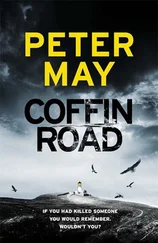Peter May - Blowback
Здесь есть возможность читать онлайн «Peter May - Blowback» весь текст электронной книги совершенно бесплатно (целиком полную версию без сокращений). В некоторых случаях можно слушать аудио, скачать через торрент в формате fb2 и присутствует краткое содержание. Жанр: Классический детектив, на английском языке. Описание произведения, (предисловие) а так же отзывы посетителей доступны на портале библиотеки ЛибКат.
- Название:Blowback
- Автор:
- Жанр:
- Год:неизвестен
- ISBN:нет данных
- Рейтинг книги:4 / 5. Голосов: 1
-
Избранное:Добавить в избранное
- Отзывы:
-
Ваша оценка:
- 80
- 1
- 2
- 3
- 4
- 5
Blowback: краткое содержание, описание и аннотация
Предлагаем к чтению аннотацию, описание, краткое содержание или предисловие (зависит от того, что написал сам автор книги «Blowback»). Если вы не нашли необходимую информацию о книге — напишите в комментариях, мы постараемся отыскать её.
Blowback — читать онлайн бесплатно полную книгу (весь текст) целиком
Ниже представлен текст книги, разбитый по страницам. Система сохранения места последней прочитанной страницы, позволяет с удобством читать онлайн бесплатно книгу «Blowback», без необходимости каждый раз заново искать на чём Вы остановились. Поставьте закладку, и сможете в любой момент перейти на страницу, на которой закончили чтение.
Интервал:
Закладка:
“It’s a pleasure to meet you,” he said. “I’ve read a great deal about you.”
“All of it good, I hope.”
Graulet smiled. “Almost none of it, actually. It seems that the French police and the political establishment are not very fond of you.”
“Only because they don’t like me showing up their mistakes. Much in the same way, I suppose, that a chef might resent you taking over his kitchen and humiliating him by preparing a better meal.”
This time the food critic laughed out loud. “God forbid! I love to eat, monsieur. I hate to cook.”
He was smaller than Enzo had been expecting. A thin, mean-faced man who did not look at all like someone who enjoyed his food. He had lively amber eyes, and for all that his facial features were not arranged in a particularly attractive way, he had a disarming smile. Enzo had come prepared not to like him, and found himself unexpectedly engaged.
He looked around at the pale yellow walls of the restaurant, the maroon chairs with their gold piping and monogrammed Gs, the books and bookshelves painted on the wall by the kitchen door. “Why did you pick this place to meet?”
“I’ve heard good things about it and want to review it in my blog. It used to be called the Barriere Poquelin, and was owned by Claude Verger. Cleverly named, don’t you think? Barriere Moliere might have been the obvious choice. But Moliere was born Jean Baptiste Poquelin. That showed some originality. As did the food. It’s where Bernard Loiseau cut his teeth and made his name before getting sucked into that dreadful place down at Saulieu.”
Enzo couldn’t resist a wry smile. “You’re not here in disguise, then?”
He laughed. “No, monsieur, I am not. If I had been, how would you have recognised me?”
“I take it the owners already have.”
“Oh, you can put money on it. But they’ll be far too discreet to say so.” He paused. “A glass of champagne?”
“I wouldn’t say no.”
Graulet caught the attention of a hovering waiter who was instantly at their table. He ordered two glasses of Veuve Clicquot and slipped on a pair of half-moon reading glasses as he lifted the menu. “I think I’ll have the Ouef de poule,” he said. “I’m interested to know what they mean by a contemporary version of Eggs Florentine.” He ran his eye down to the main courses. “Ah, and in your honour, I think I am bound to try the Selle d’agneau d’Ecosse. I expect you have sampled a fair amount of Scottish lamb in your time.”
“I have.” Enzo looked at the menu. The lamb was marinated in hibiscus, and then cooked in a saute pan. But Enzo had to smile. The menu described it as being cuite au sautoir. A nice pun, since a sautoir was both a saute pan and a St. Andrew’s Cross, the flag of Scotland. It was presented with gnocchi, preserved kumquats, and a reduction of the cooking juices. “Never had it served like this though.” He ran his eye down the other choices and decided on seasonal vegetables in an open ravioli as a starter, and civet de sanglier, a stew of wild boar, for his main course.
“Bravo,” Graulet said. “A perfect choice for a man who lives in the Lot. What wine would you like with it?” He passed Enzo the carte des vins.
“What about the Cahors? The Chateau Lagrazette.”
“I wouldn’t have expected you to pick anything else. It will go wonderfully well with the sanglier and the lamb.” He removed his reading glasses and looked candidly at Enzo. “So what do you want to know about Marc Fraysse?”
“I want to know why you printed a rumor about him losing a star when it was patently untrue.”
Graulet canted his head to one side. “Was it?”
“It was. And I got that from the horse’s mouth.”
“The horse, no doubt, being that manufacturer of pneumatic tires which likes to think of itself as being the ultimate arbiter of good taste.”
Enzo tipped his head in acknowledgement.
“Hmmm. Well, monsieur, I think I can tell you without risk of contradiction that the rumor began with Fraysse himself.”
Enzo frowned. “How’s that possible?”
“Because the man was paranoid. You have no doubt heard the story of our little contretemps that cemented our mutual dislike?”
“Yes.”
Graulet sipped his champagne thoughtfully. “I have to tell you that although I didn’t like his food, there is no doubt that he was an extremely talented chef. But his cuisine owed far too much to the traditions of the eighteenth and nineteenth century. He introduced his own slant on it, I grant you. But he failed to bring it into the twenty-first century, unlike some of his contemporaries. The excellent Michel Bras, for example, who is unique in the way he has used natural regional ingredients to transform traditional dishes. Not to mention his presentation, which is pure art. Bras is a typical of the Michelin-starred chef, while Fraysse was just another hack as far as I’m concerned. Another typical anointee of the monks of Michelin.”
“You didn’t much like him, then.”
For the first time, Graulet seemed annoyed. “It’s not a question of whether I liked him or not. He disliked me. Because he saw in my assessment of him his own worst fears. He knew I was right, and deep down inside he was terrified that one day he would be found out.”
They were interrupted by the waiter who came to take their order. When he had gone again, Enzo said, “So how did he start the rumor about himself?”
“By being afraid it was true. He lived in fear of losing a star, of the financial pain and personal humiliation that would bring. If you celebrate your success in public, you must expect that your failures will also be seen in the limelight. That winter he began phoning round all his friends in the business looking for reassurance. And in doing so sowed the seeds of doubt in the minds of others. The world of French cuisine is very small and claustrophobic, monsieur. And in the heat of the kitchen, a single microbic rumor can multiply to become raging food poisoning.” He smiled. “Of course, when I heard it, I took great pleasure in printing it. A small modicum of revenge.”
“Even though you knew it wasn’t true.”
“I knew no such thing.”
For the first time since he had sat down with the man, Enzo began to experience the dislike he had expected from the beginning. And as their starters were delivered to the table, he said, “I thought it was the job of the journalist to report facts, not speculation.”
But Graulet was unruffled. “Monsieur, in this business there is no such thing as facts. Only opinions. And although I am appalled by his murder, my opinion was, and remains, that Marc Fraysse did not merit one star, never mind three.”
Chapter Thirty-six
Saint-Pierre, Puy de Dome, France 2010
Enzo left Paris early on the Monday morning for the four-hour drive south, and reached Saint-Pierre shortly after ten. It was Toussaint, All Saints Day, a public holiday, and everywhere was deserted except for the cemeteries, where the living tended to the needs of the dead, scrubbing down tombs and gravestones and piling them high with flowers.
It was only when he pulled into the almost empty car park at the auberge that he remembered the hotel would be shut. The final meal of the season would have been served the night before, the last of the hotel guests departing just after petit dejeuner that morning. The few remaining cars, he guessed, probably belonged to staff. He knew that many of them, including the chefs, were being kept on for several days to clean and shut down the kitchen and the guest rooms for the winter.
He felt a chill in his bones as he waded through the leaves toward the front of the hotel. With the coming of November, the rain had stopped, but the mercury had tumbled, and bruised and brooding skies of pewter presaged the possibility of early snow. He did not relish the prospect.
Читать дальшеИнтервал:
Закладка:
Похожие книги на «Blowback»
Представляем Вашему вниманию похожие книги на «Blowback» списком для выбора. Мы отобрали схожую по названию и смыслу литературу в надежде предоставить читателям больше вариантов отыскать новые, интересные, ещё непрочитанные произведения.
Обсуждение, отзывы о книге «Blowback» и просто собственные мнения читателей. Оставьте ваши комментарии, напишите, что Вы думаете о произведении, его смысле или главных героях. Укажите что конкретно понравилось, а что нет, и почему Вы так считаете.












